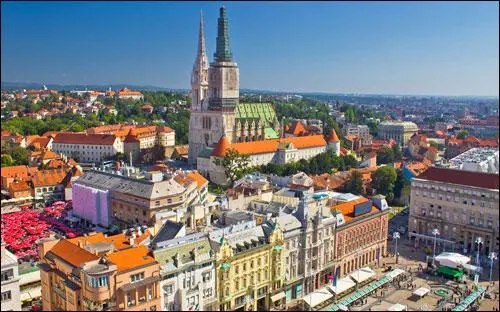Croatia, a picturesque country located in Southeast Europe, is known for its stunning Adriatic coast, rich history, and vibrant culture. Geographically, it straddles the crossroads between Central and Southeast Europe, boasting a diverse landscape that includes rocky coastlines, lush forests, and rolling plains. The nation has a population of around 4 million people, with a demographic mix that reflects its complex history. Economically, Croatia is classified as a high-income economy, with tourism, manufacturing, and services as its main pillars.
In the realm of the Internet and Information Technology (IT), Croatia has shown remarkable progress. The country has a high internet penetration rate, with a significant portion of the population having access to broadband services. The IT sector is burgeoning, with a growing number of startups and established companies contributing to the digital economy. However, Croatia still faces challenges such as a digital divide in rural areas and the need for more robust IT infrastructure to support advanced technologies.
Despite these challenges, Croatia's commitment to advancing its digital landscape is evident. The government has implemented various initiatives to boost IT education, support tech entrepreneurship, and improve digital services. This commitment has laid the groundwork for significant developments in the IT industry, including the advent of cloud server technologies.
Zagreb, the capital and largest city of Croatia, is rapidly becoming a central hub for data centers in the region. These facilities are crucial for storing, processing, and distributing large amounts of data, and they play a vital role in supporting the country's burgeoning digital economy.
The growth of data centers in Zagreb can be attributed to several factors, including the city's strategic location, stable political and economic environment, and advanced telecommunications infrastructure. Data centers in Zagreb boast state-of-the-art technological infrastructure, including high-capacity servers, energy-efficient cooling systems, and robust cybersecurity measures. These facilities are designed to ensure high availability, scalability, and security of the data they handle.
Major data centers in Zagreb, such as the recently launched Croatia Cloud Server, have significantly enhanced the IT landscape. These centers offer various services, including cloud hosting, dedicated servers, and colocation services. They boast impressive capacities, capable of handling the data needs of both local businesses and international clients.
The impact of these data centers on local and regional IT services cannot be overstated. They have improved the reliability and efficiency of digital services, supported the growth of e-commerce, and facilitated the adoption of cloud technologies by businesses of all sizes. Moreover, they have attracted foreign investment and positioned Croatia as a competitive player in the global digital economy.
The launch of the Croatia Cloud Server in Zagreb marks a significant milestone in the country's digital journey. This state-of-the-art cloud server offers a plethora of advantages, tailored to meet the needs of a diverse clientele, from startups to large corporations. Here are some key benefits:
1.Activation within 12 hours: Time is a critical factor in the digital world. The Croatia Cloud Server addresses this by ensuring rapid deployment, with servers going live within 12 hours of setup. This swift activation allows businesses to quickly scale up their operations without any significant downtime.
2.Local native IP address: Having a local IP address is beneficial for businesses targeting the Croatian market. It enhances the credibility and local relevance of digital services, improves search engine optimization (SEO) for local searches, and ensures compliance with regional data laws and regulations.
3.Managed service: The Croatia Cloud Server offers a comprehensive managed service. This includes system rebuilds and network fault detection, relieving clients of the technical complexities associated with server management. This feature is particularly beneficial for businesses without extensive IT expertise, allowing them to focus on their core operations.
4.Support for various Linux distributions: Flexibility in operating systems is crucial for diverse IT needs. The Croatia Cloud Server supports various Linux distributions, providing clients with the freedom to choose the best OS that fits their specific requirements.
5.SSD solid-state drives: Speed and reliability are essential for data storage and processing. The use of SSD solid-state drives in the Croatia Cloud Server ensures faster data access and greater reliability compared to traditional hard drives, leading to improved performance of hosted applications and services.
6.Affordable monthly rental fee: Perhaps one of the most attractive features of the Croatia Cloud Server is its cost-effectiveness. With a monthly rental fee of just $7, it provides an affordable solution for businesses seeking to leverage cloud technology without incurring significant expenses.
The launch of the Croatia Cloud Server is a game-changer for the digital landscape in Zagreb and the wider region. It not only enhances the IT infrastructure of the country but also offers businesses a competitive edge in the digital era. With its advanced features, affordability, and robust support system, the Croatia Cloud Server is set to revolutionize the digital experience in Croatia, paving the way for a more connected and technologically advanced future.
